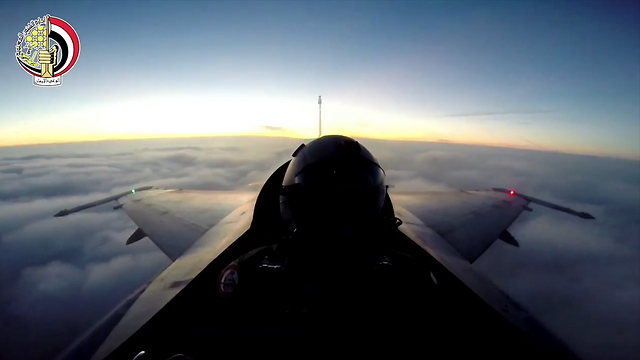Analysis: As long as the Egyptian army is growing stronger in order to transform the country into a leading force in the Sunni world and secure al-Sisi’s regime, Israel is silently trembling. But at some point, all that military strength could take on a different—perhaps hostile—significance.
There are people in Israel who have been feeling butterflies in their stomach for a long time now in light of the fact that Egypt, which is experiencing a deep economic crisis, has been purchasing the world’s most expensive weapons systems at quantities that rich Saudi Arabia would take pride in. Only recently, the Egyptian navy received a second Mistral-class helicopter carrier—a particularly expensive French system which was originally built for the Russian navy. The Egyptians purchased two.
Israeli officials asked Egypt Little Red Riding Hood-style questions: Grandma, why do you need two helicopter carriers? The Egyptians explained that one would protect the exclusive economic zone in the Mediterranean Sea, and the other would maintain Egypt’s interests in the Red Sea. The assault helicopters on the carriers were purchased by the Egyptians in Russia at full price. The Egyptian navy also purchased four new submarines from Germany and is currently negotiating the purchase of two additional advanced submarines.

The Russians are also selling Egypt S-400 antiaircraft systems. The Egyptians are buying entire squadrons of SA-17 and SA-22 anti-aircraft missiles. Grandma, Israeli officials ask, why do you need such expensive anti-aircraft systems? Whose fighter jets do you wish to shoot down? The Islamic State’s planes? Sudan’s? Does Libya have planes which are threatening you?
Israel is wondering where Egypt gets the money from and how these purchases are made possible despite the economic crisis. Another key issue with which Israel has been concerned for years is that the Egyptian army has been conducting major exercises, including one which will soon be held with Russian military forces. The main enemy in these exercises, it is safe to assume, was, and remains, Israel.
The helicopter carriers purchased by the Egyptians are called Gamal Abdel Nasser and Anwar El Sadat, names which reflect the different spirit brought by President Abdel Fattah al-Sisi, who is wagging a finger at the Muslim Brotherhood. That is also the reason why Israel has chosen to keep the question marks rather than insist on exclamation points.
The two countries view the relations between them as a first-rate strategic asset. Egypt deeply appreciates the indirect Israeli aid in the war on ISIS in Sinai. But since the battle in Sinai began, Israel has essentially freed itself from the appendix of the peninsula’s demilitarization in the peace agreement. The Egyptian army has been deployed in Sinai with more than 20 regiments, from commando forces to armed forces. For all intents and purposes, Egypt has established two military airports in Sinai. The Egyptian navy has also docked in El-Arish.
The Little Red Riding Hood questions about the long teeth grandma is growing have been increasingly troubling the Israeli upper echelon over the past year. The Egyptian economy reached a low point this year due to incomplete economic reforms, failed investments of billions in the expansion of the Suez Canal, a critical blow to tourism, a serious drought, and incorrect usage of the water system which is leading to a drop in the level of the Nile River. Furthermore, the Saudis and the Gulf states are failing to transfer money that was promised to Egypt in the form of joint foundations, loans and grants, and the International Monetary Fund is setting difficult terms for Egypt—such as a demand to cut bureaucracy, which could raise the unemployment rate to destructive levels—that are delaying the transfer of a $12 billion grant.
In order to escape the day-to-day distress, al-Sisi has handed over entire civil monopolies to the army, allowing it to keep subsidizing basic commodities. The Egyptian army is manufacturing diapers, medicines, cement, flour and more, and is basically managing not only Egyptian security policy but also the national economy.
As long as the Egyptian army is growing stronger in order to turn Egypt into a leading force in the Sunni world and to secure al-Sisi’s regime, Israel is silently trembling. But all that could disappear in a minute. According to certain estimates, Egypt could get caught in a social and governmental chaos as early as 2018. If that happens, all the military strength it is building, including the deployment in Sinai, could take on a different—perhaps hostile—significance. Someone should start thinking about it in our diligent cabinet.
As reported by Ynetnews
